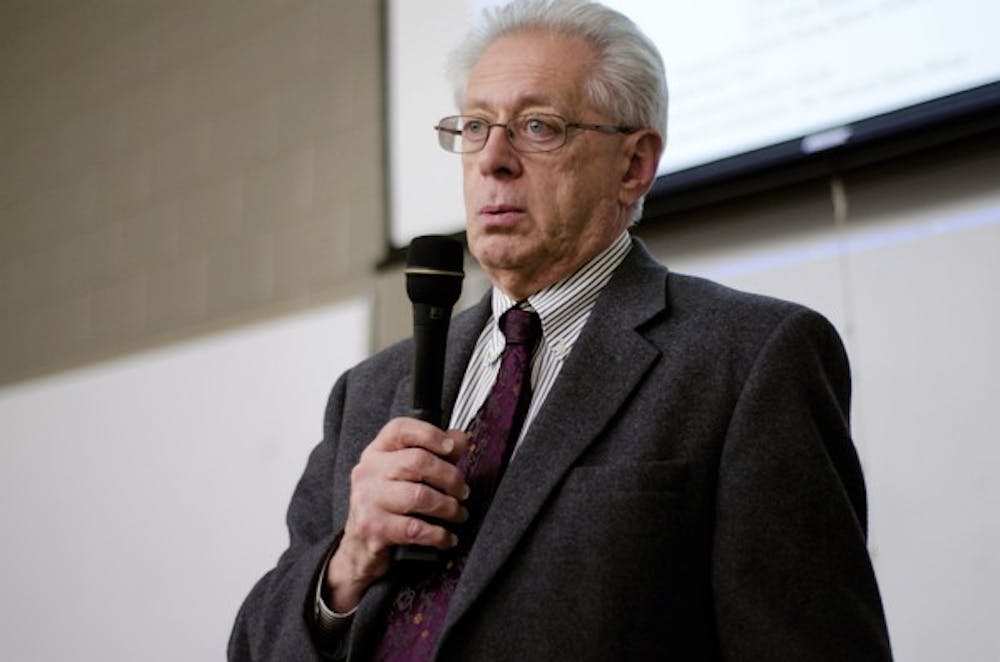A-Senate passes SGA motion opposing academic calendar change, charges report from provost

The discussion for a new 15-week academic calendar isn’t over after the Academic Senate voted Tuesday to have a committee look at the pros and cons.
Student Government Association Vice President and Hesperia senior Killian Richeson read the motion to A-Senate, which charges a report from the provost providing costs and benefits of the academic calendar change to A-Senate, so senators can have all facts to determine whether to proceed or rescind their vote for the academic calendar change.
Donna Ericksen, co-chair of the Academic Calendar Committee and professor of mathematics, said the Academic Calendar Committee was formed in response to students wanting to start the academic year after Labor Day.
Students were invited to express their support or concerns for the calendar through a survey, and students who did not have an opinion on the calendar did not answer the survey.
She said SGA never invited the chairs of the committee to hear both sides of the issues.
“This motion should be defeated because it is asking the provost office to answer questions that can’t be answered,” Ericksen said.
Vincent Cavataio, Shelby Township graduate assistant for communication and dramatic arts and former SGA president, said the academic calendar committee was invited to meet with SGA when he was president.
Richeson said students might not have responded to the survey because they would rather do classwork than take a survey that was emailed to them. SGA also has a high amount of turnover because students are always graduating, he said.
“Now that we’ve had more discussions about it … it’s clear that we do not agree with it,” he said.
Richeson said the motion is for more information on the academic calendar change because he said a lot of questions that SGA had were not answered. He said students want to know more about factors such as how the calendar would affect the cost of housing and tuition.
“We believe there are just too many unknowns,” he said.
Senator David Smith, professor of philosophy and religion, said the provost’s study might be able to address some unanswered questions.
“There is a major aspect of this that was not discussed the first time around,” he said. “Is there an academic rationale for this?”
Senator Joseph Finck, professor of physics, said he has lived through four committees trying to pass an academic calendar change, and this is the closest it has ever come to passing. He said the academic calendar committee has already spent a lot of time looking at all the issues and getting feedback.
“We were so close,” he said. “We tried to address all of these problems that we saw as important problems.”
Finck said A-Senate has had a debate before as to whether the academic calendar change was academically appropriate. He said students had expressed frustration that the fall semester started two weeks before Labor Day.
“Students are the ones who complained, and they complained loudly, that we were taking two weeks’ pay away from them for summer work,” he said. “This came from students, not from faculty.”
Finck said he would be able to make up one week of face-to-face class time with students through other mechanisms such as communication through email and Blackboard. Other senators pointed out this method would not work for all faculty, such as those teaching foreign language and music classes.
Ericksen said there were no proposed changes to the time increments of classes.
Shapiro said A-Senate recommended the Faculty Association and the university sit down and determine the new calendar, and those discussions will resume for new evidence. He said even a month’s delay for the report would not affect the implementation of the calendar scheduled for fall 2014.
A-Senate also voted to approve elections for terms that will begin in January. Andrew Spencer, professor of music, was elected senate chair elect; business information systems professor Jim Scott was elected senate secretary; Melinda Kreth, associate professor of English and Concha Allen, professor of marketing and hospitality were elected faculty senators for the senate executive board, and Eaton Rapids senior Kelly Wright was elected student senator to the senate executive board.



